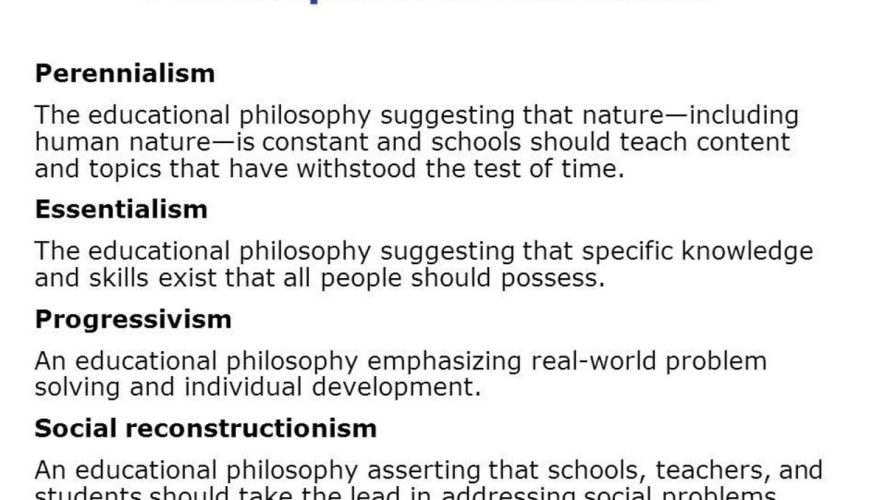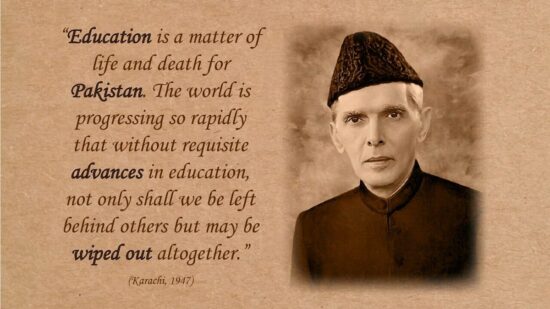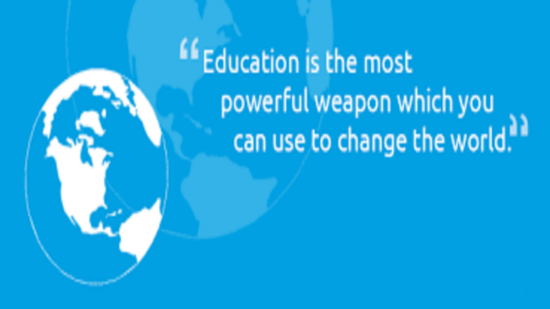Within the epistemological frame that focuses on the nature of knowledge and how we come to know, there are four major educational philosophies, each related to one or more of the general or world philosophies just discussed. These educational philosophies are currently used in classrooms the world over. They are Perennialism, Essentialism, Progressivism, and Reconstructionism. These educational philosophies focus heavily on WHAT we should teach aspect of the curriculum.
Perennialism
Perennialists believe that the focus of education should be the ideas that have lasted over centuries. They believe the ideas are as relevant and meaningful today as when they were written. They recommend that students learn from reading and analyzing the works by history’s finest thinkers and writers. Perennialists believe that when students study these works and ideas, they will appreciate learning. Perennialism aims to develop students’ intellectual and moral qualities. Perennialist classrooms are also centered on teachers in order to accomplish these goals. The teachers are not concerned about the students’ interests or experiences. They use tried and true teaching methods and techniques that are believed to be most beneficial to disciplining students’ minds. The perennialist curriculum is universal and is based on their view that all human beings possess the same essential nature. Perennialists think it is important that individuals think deeply, analytically, flexibly, and imaginatively. They emphasize that students should not be taught information that may soon be outdated or found to be incorrect. Perennialists disapprove of teachers requiring students to absorb massive amounts of disconnected information. They recommend that schools spend more time teaching about concepts and explaining they are meaningful to students. The only example I can think of would be a class about religion or history. The instructor would use religious books and historical documents.
For perennialists, the aim of education is to ensure that students acquire understandings about the great ideas of civilization. These ideas have the potential for solving problems in any era. The focus is to teach ideas that are everlasting, to seek enduring truths which are constant, not changing, as the natural and human worlds at their most essential level, do not change. Teaching these unchanging principles is critical. Humans are rational beings, and their minds need to be developed. Thus, cultivation of the intellect is the highest priority in a worthwhile education. The demanding curriculum focuses on attaining cultural literacy, stressing students’ growth in enduring disciplines. The loftiest accomplishments of humankind are emphasized– the great works of literature and art, the laws or principles of science. Advocates of this educational philosophy are Robert Maynard Hutchins who developed a Great Books program in 1963 and Mortimer Adler, who further developed this curriculum based on 100 great books of western civilization.
Essentialism
Essentialism tries to instill all students with the most essential or basic academic knowledge and skills and character development. Essentialists believe that teachers should try to embed traditional moral values and virtues such as respect for authority, perseverance, fidelity to duty, consideration for others, and practicality and intellectual knowledge that students need to become model citizens. The foundation of essentialist curriculum is based on traditional disciplines such as math, natural science, history, foreign language, and literature. Essentialists frown upon vocational courses. In the essentialist system, students are required to master a set body of information and basic techniques for their grade level before they are promoted to the next higher grade. The content gradually moves towards more complex skills and detailed knowledge. Essentialists argue that classrooms should be teacher-oriented. The teacher should serve as an intellectual and moral role model for the students. The teachers or administrators decide what is most important for the students to learn with little regard to the student interests. The teachers also focus on achievement test scores as a means of evaluating progress. The essentialist classroom is centered on students being taught about the people, events, ideas, and institutions that shape society. Essentialists hope that when students leave school, they will not only possess basic knowledge and skills, but they will also have disciplined, practical minds, capable of applying lessons learned in school in the real world. Essentialism is different from what Dewey would like to see in the schools. Students in this system would sit in rows and be taught in masses. The students would learn passively by sitting in their desks and listening to the teacher. An example of essentialism would be lecture based introduction classes taught at universities. Students sit and take notes in a classroom which holds over one hundred students. They take introductory level courses in order to introduce them to the content. After they have completed this course, they will take the next level course and apply what they have learned previously. English 101 and English 102 are a specific example of essentialism.
Essentialists believe that there is a common core of knowledge that needs to be transmitted to students in a systematic, disciplined way. The emphasis in this conservative perspective is on intellectual and moral standards that schools should teach. The core of the curriculum is essential knowledge and skills and academic rigor. Although this educational philosophy is similar in some ways to Perennialism, Essentialists accept the idea that this core curriculum may change. Schooling should be practical, preparing students to become valuable members of society. It should focus on facts-the objective reality out there–and “the basics,” training students to read, write, speak, and compute clearly and logically. Schools should not try to set or influence policies. Students should be taught hard work, respect for authority, and discipline. Teachers are to help students keep their non-productive instincts in check, such as aggression or mindlessness. This approach was in reaction to progressivist approaches prevalent in the 1920s and 30s. William Bagley, took progressivist approaches to task in the journal he formed in 1934. Other proponents of Essentialism are: James D. Koerner (1959), H. G. Rickover (1959), Paul Copperman (1978), and Theodore Sizer (1985).
Progressivism
Progressivists believe that individuality, progress, and change are fundamental to one’s education. Believing that people learn best from what they consider most relevant to their lives, progressivists center their curricula on the needs, experiences, interests, and abilities of students. Progressivist teachers try making school interesting and useful by planning lessons that provoke curiosity. In a progressivist school, students are actively learning. The students interact with one another and develop social qualities such as cooperation and tolerance for different points of view. In addition, students solve problems in the classroom similar to those they will encounter in their everyday lives. Progressivists believe that education should be a process of ongoing growth, not just a preparation for becoming an adult. An obvious example of progressivism would be our class. We are in groups a lot and we actively learn through discussion. We talk about how what we read can be incorporated into our future teaching careers. Dr. Theodore takes into account the suggestions from the previous semester’s students and modifies his class accordingly.
After reading John Dewey’s book and discussing his thoughts and ideas in class, one can see John Dewey’s relationship to progressivism. He wanted students to learn through action and being involved in the processes that will get to the end product. He wanted the students to work on hands-on projects so learning would take place, rather than memorization. In a regular classroom students just memorize what they need to know and it goes away after the test. In Dewey’s mind, the students would have to exercise their brain by problem solving and thinking critically, resulting in learning (even though the students may not even know it!). This allows the individual’s brain to develop, so as the individual grows learning becomes easier! After attending a school Dewey would have set up, a child would be ready for the real world and a lot of the everyday setbacks that an individual would experience, such as losing a button, changing a tire, making lunch, or balancing a checkbook. School would be a lot of hands-on learning, and the progression of education would not end!
Progressivists believe that education should focus on the whole child, rather than on the content or the teacher. This educational philosophy stresses that students should test ideas by active experimentation. Learning is rooted in the questions of learners that arise through experiencing the world. It is active, not passive. The learner is a problem solver and thinker who make meaning through his or her individual experience in the physical and cultural context. Effective teachers provide experiences so that students can learn by doing. Curriculum content is derived from student interests and questions. The scientific method is used by progressivist educators so that students can study matter and events systematically and first hand. The emphasis is on process-how one comes to know. The Progressive education philosophy was established in America from the mid-1920s through the mid-1950s. John Dewey was its foremost proponent. One of his tenets was that the school should improve the way of life of our citizens through experiencing freedom and democracy in schools. Shared decision making, planning of teachers with students, student-selected topics are all aspects. Books are tools, rather than authority.
Reconstructionism / Critical Theory
Social Reconstructionism is a philosophy that emphasizes the addressing of social questions and a quest to create a better society and worldwide democracy. Reconstructionist educators focus on a curriculum that highlights social reform as the aim of education. Theodore Brameld (1904-1987) was the founder of Social Reconstructionism, in reaction against the realities of World War II. He recognized the potential for either human annihilation through technology and human cruelty or the capacity to create a beneficent society using technology and human compassion. George Counts (1889-1974) recognized that education was the means of preparing people for creating this new social order.
Critical theorists, like social reconstructionists, believe that systems must be changed to overcome oppression and improve human conditions. Paulo Freire (1921-1997) was a Brazilian whose experiences living in poverty led him to champion education and literacy as the vehicle for social change. In his view, humans must learn to resist oppression and not become its victims, nor oppress others. To do so requires dialog and critical consciousness, the development of awareness to overcome domination and oppression. Rather than “teaching as banking,” in which the educator deposits information into students’ heads, Freire saw teaching and learning as a process of inquiry in which the child must invent and reinvent the world.
For social reconstructionists and critical theorists, curriculum focuses on student experience and taking social action on real problems, such as violence, hunger, international terrorism, inflation, and inequality. Strategies for dealing with controversial issues (particularly in social studies and literature), inquiry, dialogue, and multiple perspectives are the focus. Community-based learning and bringing the world into the classroom are also strategies.
OTHER RELATED POSTS



